
An introduction to the legal issues surrounding modern business.
- Subject:
- Business and Communication
- Law
- Material Type:
- Textbook
- Author:
- Saylor Foundation
- Date Added:
- 07/14/2021

An introduction to the legal issues surrounding modern business.
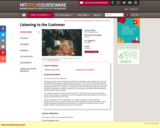
Introduction to "soft" consumer research methods, useful for getting quick customer input into decisions on product design and development, strategic positioning, advertising, and branding. Covers interview techniques, observational methods, Voice of the Customer, focus groups, and analyses suitable for qualitative data. Introduces new information-gathering methods in development at MIT.

Our subject is the ethics of leadership, an examination of the principles appealed to by executive authority when questions arise about its sources and its legitimacy. Most treatments of this subject resort to case-studies in order to illustrate the application of ethical principles to business situations, but our primary emphasis will be upon classic works of imaginative literature, which convey more directly than case-studies the ethical pressures of decision-making. Readings will include works by Shakespeare, Sophocles, Shaw, E.M. Forster, Joseph Conrad, George Orwell, Fyodor Dostoyevsky, and Henrik Ibsen, among others. Topics to be discussed include the sources of authority, the management of consensus, the ideal of vocation, the ethics of deception, the morality of expediency, the requirements of hierarchy, the virtues and vices of loyalty, the relevance of ethical principles in extreme situations.

Quantitative techniques of operations research with emphasis on applications in transportation systems analysis (urban, air, ocean, highway, and pickup and delivery systems) and in the planning and design of logistically oriented urban service systems (e.g., fire and police departments, emergency medical services, and emergency repair services). Unified study of functions of random variables, geometrical probability, multi-server queuing theory, spatial location theory, network analysis and graph theory, and relevant methods of simulation. Computer exercises and discussions of implementation difficulties.
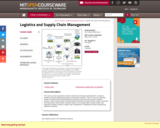
This course surveys operations research models and techniques developed for a variety of problems arising in logistical planning of multi-echelon systems. There is a focus on planning models for production/inventory/distribution strategies in general multi-echelon multi-item systems. Topics include vehicle routing problems, dynamic lot sizing inventory models, stochastic and deterministic multi-echelon inventory systems, the bullwhip effect, pricing models, and integration problems arising in supply chain management. Probability and linear programming experience required.
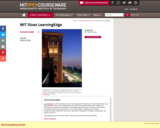
LearningEdge is a free learning resource for management educators and students provided open and available to the world. Developed by MIT Sloan faculty and students, this collection of teaching case studies and management flight simulations focuses on areas in which Sloan's innovative research and teaching are on the cutting edge, including entrepreneurship, leadership and ethics, operations management, strategy, sustainability, and system dynamics.
LearningEdge was formerly MIT Sloan Teaching Innovation Resources (MSTIR).

15.015 Macro and International Economics focuses on the policy and economic environment of firms. This subject divided in three parts. The first part of the course is a study of the closed economy and how monetary and fiscal policy interacts with employment, GNP, inflation, and interest rates. Next, the course provides an examination of national economic strategies for development and growth and recent financial and currency crises in emerging markets. Finally, the course addresses the problems faced by transition economies and the role of institutions both as the engine of growth, and as the constraints for policy.
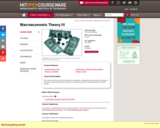
Consumption and savings decisions under certainty and uncertainty. Aggregate savings, wealth, and fiscal policy. Portfolio choice and asset pricing. Investment and finance decisions. Half-term subject. This course covers issues in the theory of consumption, investment and asset prices. We lay out the basic models first, and then examine the empirical facts that motivate extensions to these models.
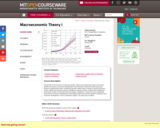
Models of economic growth, old and new. Half-term subject. Introduction to the theories of economic growth. Topics will include basic facts of economic growth and long-run economic development; brief overview of optimal control theory and dynamic programming; basic neoclassical growth model under a variety of market structures; human capital and economic growth; endogenous growth models; models with endogenous technology; models of directed technical change; competition, market structure and growth; financial and economic development; international trade and economic growth; institutions and economic development.
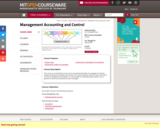
This course is an introduction to the use of accounting information by managers for decision making, performance evaluation and control. The course should be useful for those who intend to work as management consultants, for LFM (Leaders for Manufacturing) students, and in general, for those who will become senior managers.

Communication is the heart of business. Short emails, complex reports, private chats, impassioned pitches, formal presentations, and team meetings move information and ideas around an organization, define strategy, and drive decisions. Business communication is concise, direct, clear, and compelling.
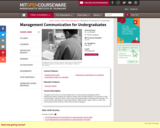
The goal of this course is to help students learn to communicate strategically within a professional setting. Students are asked to analyze their intended audience, the purpose of their communication, and the context in which they are operating before developing the message. The course focuses specifically on improving students' ability to write, speak, work in a team, and communicate across cultures in their roles as future managers.
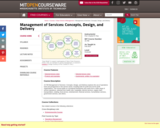
Management of Services: Concepts, Design, and Delivery explores the use of operations tools and perspectives in the service sector, including both for-profit and not-for-profit organizations. The course builds on conceptual frameworks and cases from a wide range of service operations, selected from health care, hospitality, internet services, supply chain, transportation, retailing, food service, entertainment, financial services, humanitarian services, government services, and others.
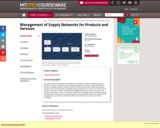
Explores the difference between service and manufacturing operations, and the degree of distinct management skills and tools required. Analyzes cases selected from a variety of service operations with a particular focus on e-commerce. Guest speakers from specific service industries discuss the essence of managing those operations. This course covers organizational, strategic and operational aspects of managing Supply Networks (SNs) from domestic and international perspectives. Topics include alternative SN structures, strategic alliances, design of delivery systems and the role of third party logistics providers. Many of the activities exchanged among enterprises in a SN are of a service nature, and the final output is often a combination of tangible products and services which the end-customer purchases. A series of concepts, frameworks and analytic tools are provided to better understand the management of service operations. Guest speakers share their experiences in managing SNs and services. Restricted to MIT Sloan Fellows in Innovation and Global Leadership.

This course looks at the role of accounting in the management process, cost systems, capital investment, and more.
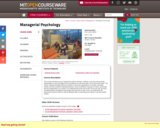
Core subject for students majoring in management science. Surveys individual and social psychology and organization theory interpreted in the context of the managerial environment. Laboratory involves projects of an applied nature in behavioral science. Emphasizes use of behavioral science research methods to test hypotheses concerning organizational behavior. Instruction and practice in communication include report writing, team decision-making, and oral and visual presentation.
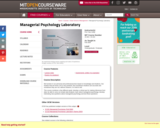
Core subject for students majoring in management science. Surveys individual and social psychology and organization theory interpreted in the context of the managerial environment. Laboratory involves projects of an applied nature in behavioral science. Emphasizes use of behavioral science research methods to test hypotheses concerning organizational behavior. Instruction and practice in communication include report writing, team decision-making, and oral and visual presentation. Twelve units may be applied to the General Institute Laboratory Requirement.
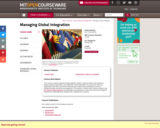
This course on global integration brings together matters of global markets and institutions, global strategy, organization, and leadership. Global integration, the process by which an organization with units around the world becomes united, will be presented as a link to entrepreneurship and general management. The seminar is offered only to those enrolled in the MIT Sloan Fellows Program and challenges the participants to draw upon their past managerial experiences, especially those affiliated with multinational companies.
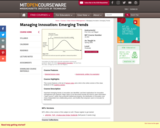
Introduction to the sources of technological innovation, economics of innovation, protection of innovation rights, communication of technical information, capturing benefit from innovation, organizing to manage the innovation process, cooperation in the innovation process, new ventures. 15.351 is a full-term subject with greater detail on technology strategy and on product development and implementation. 15.352 is a half-term subject. Students cannot receive credit for both subjects.
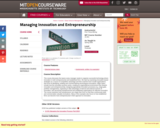
This course discusses the basics every manager needs to organize successful technology-driven innovation in both entrepreneurial and established firms. We start by examining innovation-based strategies as a source of competitive advantage and then examine how to build organizations that excel at identifying, building and commercializing technological innovations. Major topics include how the innovation process works; creating an organizational environment that rewards innovation and entrepreneurship; designing appropriate innovation processes (e.g. stage-gate, portfolio management); organizing to take advantage of internal and external sources of innovation; and structuring entrepreneurial and established organizations for effective innovation. The course examines how entrepreneurs can shape their firms so that they continuously build and commercialize valuable innovations. Many of the examples also focus on how established firms can become more entrepreneurial in their approach to innovation.